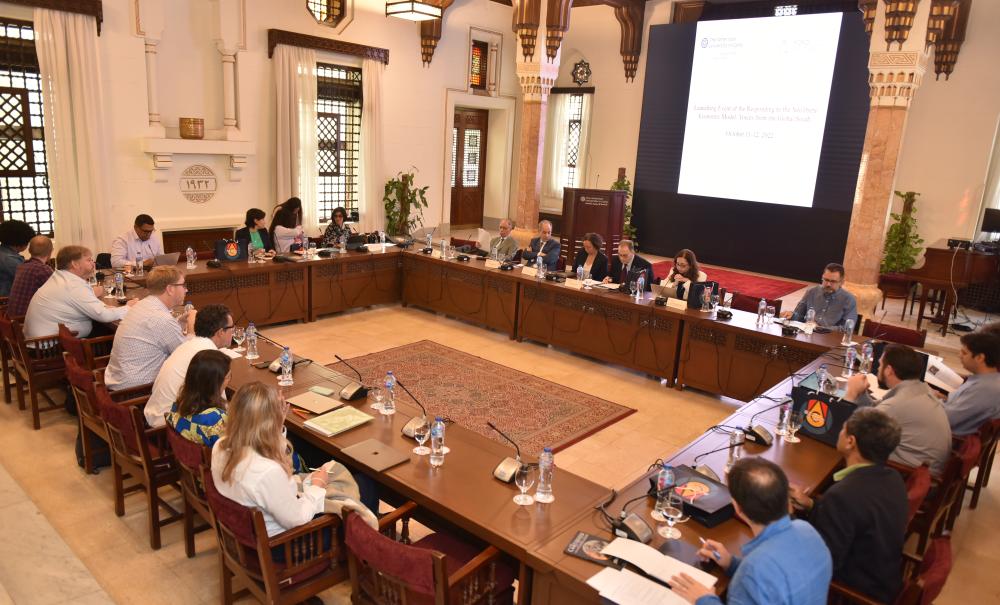
GAPP and Ford Foundation Launches the Responding Neoliberal Economic model: Voices from the Global South
Representatives from Ford Foundation offices in the Middle East, Washington D.C., Latin America and South Asia as well as Ford Foundation grantees from five institutions from the Global South, including the AUC gathered on October 11 and 12, 2022 at the American University in Cairo Tahrir Campus for the launching event titled “Responding to the Neoliberal Economic Model: Voices from the Global South.”
The launch event included scholars from La Universidad de Los Andes (Colombia), Colegio de Mexico (Mexico), University of Witwatersrand (WITS) (South Africa ) and IT Mumbai (India) in addition to the AUC, each with a regional focus with the aim of creating a complementary agenda for the Global South. A representative from Hewlett Foundation also attended the launch, a partner institution with Ford that has provided financial support for a broad constellation of leading universities in the Global North.
With remarks from AUC President Ahmed Dallal and Noha EL-Mikawy, Dean of Global Affairs and Public Policy emphasized the importance of narrative and a comprehensive approach to strategy. In addition, Srinivasan Iyer, the senior program officer at the Ford Foundation, highlighted the importance of this initiative and the principle behind it, which is making a broad social change and an opportunity to invest in ideas and democratize policymaking, as well as recognizing the need for ideas from the Global South.
The event also included discussions and reflections, with experts debating the different definitions of Neoliberalism, the role of the state vis-a-vis the economy, and the question concerning individualism. The discussions covered topics ranging from social change, the rise of economic nationalism and populism to the impact of neoliberal policies in the MENA region.
The discussions also tackled the need for embracing change and exploring alternatives to Neoliberalism in modern economics. The conversation began by defining the key characteristics of neoliberalism, including the type of state intervention, common sense conceptions, and the emphasis on an efficient market. The impact of privatization and deregulation on business value and market dynamics was also explored in depth.
Neoliberalism has significantly influenced societal and economic structures over the past four decades, leading to a shift in the traditional roles of the state and the market. A key aspect of the Neoliberal ideology has been the belief that the natural order is the market, while the state is a created entity. This has resulted in a push for the privatization of industries and a decrease in government intervention either as a regulator or as a provider of public goods and social services.
The discussion also focused on the power dynamics and accountability within the Neoliberal framework, raising questions about the distribution of power and the role of social change.
In seeking alternative paradigms to Neoliberalism, the panelists emphasized the importance of challenging common conceptions and providing alternative narratives.
Ibrahim Awad, CO-PI of the pathways project- and Amr Adly, the PI-. discussed the crisis that the Neoliberal world has manifested both economically and ideologically in the past decade. The discussion focused on the importance of creating viable alternatives to Neoliberalism. In addition, the project can be pursued as a redefinition of politics and the economy by addressing the policies, norms, and regulations in place, governance institutions, and critics of current values.
Overall, the event aimed to redefine the political economic situation of Neoliberalism, moving beyond class-dominated analysis to include matters such as gender, race and generation.The event also highlighted the importance of redefining global categories for policy influence and the vital role of academic institutions in producing new economic models. It was a chance for AUC-based “Pathways from Neoliberalism” project and its partners to meet and debate future developments and collaborations.